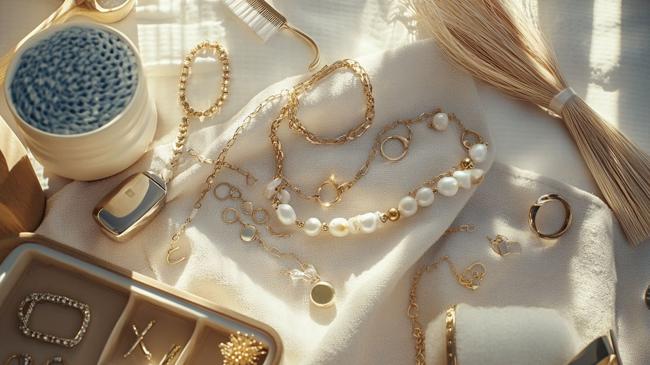Summary
Learn essential jewellery care tips to prevent infections and allergies, ensuring your pieces remain safe and stylish for everyday wear.
Source: Oneindia

AI News Q&A (Free Content)
Q1: What are some effective strategies for preventing infections caused by wearing jewellery?
A1: To prevent infections from jewellery, it's crucial to keep the pieces clean and dry. Regular cleaning with mild soap and water can remove dirt and bacteria. It's also advisable to avoid wearing jewellery in water, such as during swimming or bathing, to prevent exposure to moisture that can harbor bacteria. When not wearing jewellery, store it in a dry, clean place to minimize the risk of contamination.
Q2: How do nickel allergies manifest in individuals wearing jewellery, and what precautions can be taken?
A2: Nickel allergies often result in allergic contact dermatitis, characterized by a rash, redness, and itching where the skin comes into contact with nickel-containing jewellery. To prevent such reactions, individuals can choose jewellery made from hypoallergenic materials like titanium or surgical-grade stainless steel. It's also beneficial to coat the jewellery with clear nail polish as a barrier or opt for jewellery specifically labeled as nickel-free.
Q3: What role does regular cleaning play in maintaining jewellery hygiene and preventing skin reactions?
A3: Regular cleaning of jewellery is essential to remove accumulated dirt, oils, and bacteria, which can cause skin reactions or infections. Using mild soap and warm water to clean jewellery and drying it thoroughly can prevent moisture buildup, reducing the risk of bacterial growth. For more delicate pieces, professional cleaning services can ensure thorough and safe maintenance.
Q4: What are the latest scientific findings on metal hypersensitivity related to jewellery?
A4: Recent studies have identified type IV hypersensitivity reactions, particularly allergic contact dermatitis caused by nickel, as the most common form of metal hypersensitivity. These reactions can lead to localized soft tissue reactions and delayed wound healing. Awareness of metal allergies is crucial, and individuals with known sensitivities should opt for jewellery made from inert materials to avoid complications.
Q5: How can individuals with known metal allergies safely enjoy wearing jewellery?
A5: Individuals with metal allergies should seek jewellery made from hypoallergenic materials such as pure gold, platinum, or titanium. It's important to verify that jewellery is nickel-free and, if symptoms persist, consult a dermatologist for potential treatments or alternative solutions. Custom jewellery options are also available for those with specific allergies.
Q6: What are some common myths about jewellery allergies and infections, and what are the facts?
A6: A common myth is that only cheap jewellery causes allergies and infections. However, even expensive pieces can contain allergenic metals like nickel. Another myth is that allergies to jewellery are rare; in reality, metal allergies are quite common. The fact is that understanding the materials in your jewellery and opting for hypoallergenic options can significantly reduce the risk of reactions.
Q7: What recommendations are provided for individuals undergoing surgery with metal implants concerning jewellery allergies?
A7: For individuals undergoing surgery with metal implants, it's recommended to disclose any known metal sensitivities to healthcare providers. This information can guide the selection of implant materials, such as opting for titanium or carbon fiber instead of nickel-containing ones. Pre-surgical assessments can help prevent postoperative complications related to metal hypersensitivity.
References:
- Nickel allergy to orthopaedic implants: A review and case series.
- Amethyst





